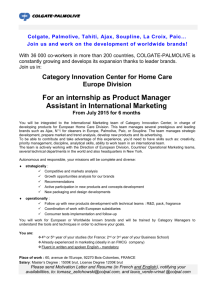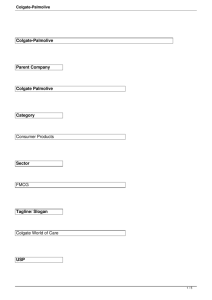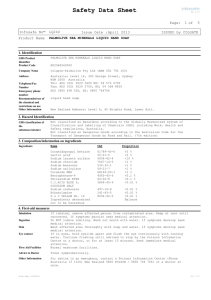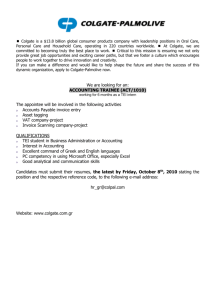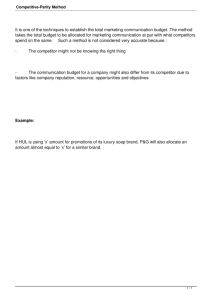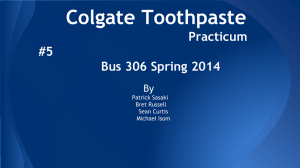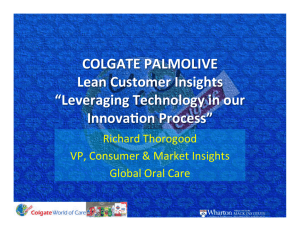The Sustainability of Protex and Palmolive in
advertisement
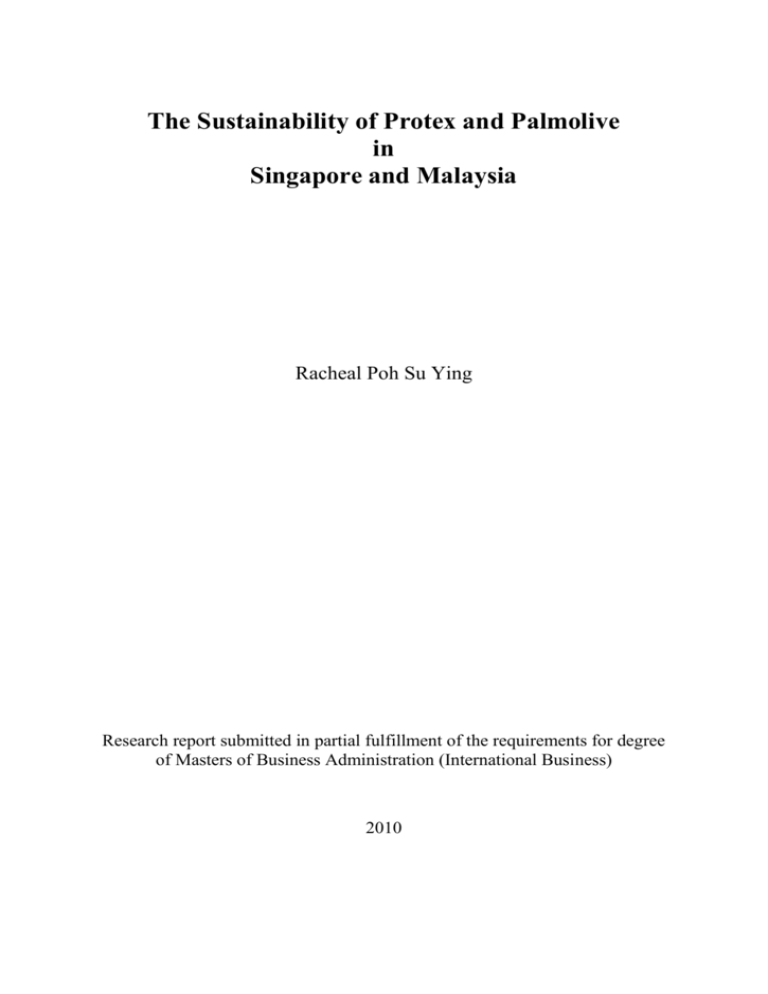
The Sustainability of Protex and Palmolive in Singapore and Malaysia Racheal Poh Su Ying Research report submitted in partial fulfillment of the requirements for degree of Masters of Business Administration (International Business) 2010 i ACKNOWLEDGEMENTS First and foremost, I would like to extend my sincere gratitude to my research supervisor, Mr. Shahidan Shafie who was always willing to offer his valuable time and support to guide me throughout this research. This case study would not have been possible if without Mr. Shahidan Shafie‘s invaluable advice. A special thanks to all my MBA colleagues for their guidance in writing the case study and sharing their thoughts throughout the case study writing. I am grateful to have a group of facilitative colleagues to help me in the data collections and I am indebted to these people who supported me all throughout the journey. My deepest gratitude is to be extended to my family members, who have given me moral supports and encouragements throughout the case study. Last but not least, I would like to express my genuine compliments to all the lecturers in the MBA program of Universiti Sains Malaysia especially Dr Sofri Yahya and Dr Siti Nabiha for their guidance towards the case study. My special thanks to Mr. Soon Boon Han, the consumer insights manager of Colgate Palmolive who has been a good facilitator to provide the relevant information‘s needed to complete the case study. Racheal Poh TABLE OF CONTENTS Page TABLE OF CONTENTS iii LIST OF TABLES vii LIST OF FIGURES viii Chapter1:INTRODUCTION 13 1.2 Background of the Company 1 1.3 The Products of Colgate Palmolive 1 1.4 The Problem Statement 3 1.5 Issues Examined in the Case 7 1.5.1 Fierce Competition in the Bath and Shower Industry 7 1.5.2 Problems with Visibility and Appeal 8 1.5.3 Saturation of the Singaporean Retail Market 9 1.5.4 Lack of brand loyalty 9 1.5.5 Similar Products Sold in Singapore and Malaysia 10 1.5.6 Changing Roles of Consumer Behavior 12 1.6 Research Objectives 12 1.7 Research Questions 13 1.8 Significance of Study 14 1.9 Summary and Organization of Remaining Chapters 14 CHAPTER 2: LITERATURE REVIEW 28 2.1 Industry Profile 16 2.1.1 The Overview of the Bath and Shower Industry in Singapore 16 2.1.2 The Liquid Soap Market Share in Singapore 18 2.1.3 Prospects of Bath and Shower Industry in Singapore 21 2.1.4 The Overview of the Bath and Shower Industry in Malaysia 22 ii 2.1.5 The Liquid Soap Market Share in Malaysia (By Brands) 24 Company Profile 27 2.2.1 The History of Colgate Palmolive 27 2.2.2 The Main Pillars of Colgate Palmolive’s Business Strategies 28 2.3 The Four Strategic Initiatives 29 2.4 The Top Management of Colgate Palmolive 32 2.5 The Strategic Initiatives of its People 33 2.6 Financial Performance of Colgate Palmolive Corporation (Headquartered in US) 33 2.7 Mission of the Colgate Palmolive 34 2.8 Vision of Colgate Palmolive 34 2.9 Values of Colgate Palmolive 34 2.9.1 Caring 34 2.9.2 Global Teamwork 35 2.9.3 Continuous Improvement 35 2.2 2.10 The Product of Colgate Palmolive in Singapore and Malaysia 36 2.11 The Literature Review 38 2.11.1Definition of Key Terms 38 2.11.2 Brand Image 41 2.11.3Brand Perception 47 2.11.4 Commitment and Brand Loyalty 48 2.11.5 Product Reliability 49 2.11.6 Blue Ocean Strategy 50 2.11.7Advertising and Sales Promotion Costs 52 2.11.8 Effective advertising 63 2.11.9 Managing the Shelf Space 312 2.11.10 The Product Life Cycle (PLC) 89 iii 2.11.11The Consumer Decision Making Styles CHAPTER 3: COUNTRY ANALYSIS 330 78 3.1 An Introduction of Singapore 345 3.2 Environmental Analysis of Singapore 352 3.2.1Social Systems 352 3.2.2The Economic Situation in Singapore 136 3.2.3The Political Environment in Singapore 373 3.2.4The Technological Environment in Singapore 148 3.3 The Malaysian History 162 3.4 The Evolution of Malaysia 398 3.5 The Political Environment in Malaysia 405 3.6 The Economic Environment in Malaysia 409 3.7 The Social and Cultural Environment in Malaysia 181 3.8 The Technological Environment in Malaysia 191 CHAPTER 4: CASE METHODOLOGY 96 4.1 Data Collection 435 4.2 Observation 438 4.3 Content Analysis of Documents 440 4.4 Collection and Analysis of Other Archival, Administrative and Performance Data 442 4.5 Individual In-depth Interviews 215 4.6 Types of Analysis Used in the Case Study 449 CHAPTER 5: CASE WRITE UP 103 5.1 469 Introduction of Colgate Palmolive CHAPTER 6:CASE ANALYSIS 112 6.1 Protex and the Trend Towards Liquid Soap 515 6.2 Total Media Expenditure for the Liquid Soap Category in Singapore iv 64 6.3 Reconstructing the Market Boundaries to Define the Target Market of Protex 520 6.4 Focus on the Big Picture of Protex as a Hygiene Brand and Not the Numbers 522 6.5 Reach Beyond Existing Demand by Increasing the Protex Brand Awareness and Positioning 524 6.6 Protex and Its Brand Positioning 526 6.7 Formulate the Right Strategic Sequence 527 6.8 Overcoming Organizational Hurdles by Right Advertising 531 6.9 Build Execution into Strategy 533 6.10 Case Analysis on Palmolive 535 6.10.1The Effects of Media Expenditure of Palmolive 535 6.10.2Cloud Marketing as The New Age Of Marketing 538 CHAPTER 7: CONCLUSION 134 7.1 Recapitulation of The Case 539 7.2 Recommendations For Protex 542 7.2.1Instill Emotional Touch in Print Advertisements 542 7.2.2Revamp The Packaging of Protex 545 7.2.3Introduce Promotions and Product Sampling on the Shop Floor 547 Recommendations For Palmolive 548 7.3.1Utilizing the Product Life Cycle to Launch Palmolive 548 7.3 Truth 7.3.2Product Introduction Using In Store Advertising to Capture the First Moment of 549 7.3.3Growth Stage by Marketing Palmolive Through Technology 550 7.3.4Maturity Stage Where Marketing is expanded to iPhone Applications 552 REFERENCES 139 APPENDIXES 151 v LIST OF TABLES Page 20 Table 2.1.2 Forecast Sales of Bath and Shower Products by Subsector: Value 2008-2013 Table 2.11.6 The Differences Between the Blue and Red Ocean Strategy 50 Table 2.11.7 The Top US Consumer Goods Companies Media Spending Figures 54 Table 2.11.11 Scores on Hofstede‘s Dimensions for Australia and Singapore 64 Table 3.6 The Major Exports of Malaysia 79 Table 5.1 Brands of Six Multinational Companies in 67 countries 95 Table 6.1 The Liquid Shower Hygiene and Beauty Soap Market Share in Singapore 100 Table 6.3 The Price of Liquid Soaps in Malaysia 104 Table 6.4 The Strength, Weakness, Opportunities & Threat (SWOT) Analysis of Colgate Palmolive 106 vi LIST OF FIGURES Page 18 Figure 2.1.2 The Liquid Soap Market Share in Singapore (By Brands) Figure 2.1.5 The Liquid Soap Market Share in Malaysia (By Brands) 24 Figure 2.6 Operating Profit of Colgate Palmolive in 2010 33 Figure 2.10 Products Chart of Colgate Palmolive 36 Figure 2.11.10 Product Life Cycle 61 Figure 6.2 (a) Total Media Expenditure in Singapore as of April 2010 101 Figure 6.2 (b) Total Media Expenditure in Malaysia as of April 2010 102 Figure 6.4 Value Share of Bar Soap for Protex Variants 105 Figure 6.5(a) Consumer Disposition Funnel for Bar Soap Category 108 Figure 6.5(b) Consumer Disposition Funnel for Liquid Soap Category 109 Figure 6.6 The Brand Positioning of Protex for the Bar Soap Category 110 Figure 6.7 Perception of Liquid Brands among Antibacterial Liquid Soaps 112 Figure 6.8 The Protex Brand Positioning 116 Figure 6.9 Percentage of Brand Awareness for All Antibacterial Users 117 Figure 6.10.1 Breakdown of the Palmolive variants in Singapore for period ended April 2010. 120 Figure 7.2.1(a) Things You Touch Stay with You 124 Figure 7.2.1(b) Things You Touch Stay with You 125 Figure 7.2.2(a) Proposed Packaging for Protex 128 Figure 7.2.2(b) Proposed Packaging for Protex in Different Colored Bottles 129 vii ABSTRACT The purpose of the case study is to seek for ways to produce transformative results that dramatically would change the branding of Protex and Palmolive brand in Malaysia and Singapore. Both brands represent two significant markets, where Protex is the focus of the hygiene market whereas the Palmolive brand is positioned as beauty soap. The brands belong to one of the world‘s famous consumer goods company, Colgate Palmolive. Little research attention has been paid to the issues faced by Colgate Palmolive which had significantly affected the sales of Protex and Palmolive as these brands are established and well known globally. This paper addresses the issues of increased competitors in the bath and shower industry and the changing demographics of the consumers in Singapore and Malaysia which affects the consumer purchasing decisions. Colgate Palmolive is aware of such differences however based on limited resources and cost cutting measures the company had implemented in the past years, it is difficult to coordinate and implement the marketing plans in both countries as the revenues generated are different. The methodology of the case study involves an investigation of the consumer purchasing habits when it comes to selecting a particular soap brand using surveys distributed to the consumers. This research paper incorporates a series of mixed methods approach incorporating the consumer brand awareness with advertisement recalls and linking it back to the changed consumer demographics. viii EXECUTIVE SUMMARY Colgate-Palmolive (CP) is a company that offers the quality products ranging from products that cater for the individual and household. The renowned category of product includes oral care, personal care, household-surface care, fabric care and pet nutrition. Colgate Palmolive established its operational presence in more than 90 countries and it is well-known brand names as Colgate, Palmolive, Mennen, Softsoap, Irish Spring, Protex, Sorriso, Kolynos, Ajax, Axion, Soupline, Suavitel and Fab, as well as Hill's Science Diet and Hill's Prescription diet pet foods. The study discusses about the issues faced in the liquid bath and shower industry in Malaysia and Singapore where the modern Singaporean men and women are well-educated, with significant numbers attaining tertiary education qualifications pose a different demographic trend as compared to the Malaysians who continued to perceive premium bath and shower products to be unnecessary or too expensive for their household. Hence, it is difficult for Protex to position as a hygiene brand where other competitors are leveraging on advertising expenses such as Lifebuoy and Dettol. With Colgate Palmolive‘s cost cutting measures, it had added the significant challenges that Protex and Palmolive faced in the industry. The prime factor that induced the researcher to look into Palmolive was because it puzzled the researcher that Colgate Palmolive knew that Palmolive is not a well accepted brand in Singapore, nevertheless the company still maintains its existence in the country due to the unified global strategies and considering that Palmolive is a heritage brand. ix In addition, what perplexes the issues is that the researcher found out that Palmolive is not growing in Singapore but the Colgate Palmolive still maintains the business in the industry. Therefore, the researcher gathered information from the observation in Singapore, studied the consumer purchasing habits and decision making and translate the feedbacks into recommended strategies for Protex and Palmolive. The case study concluded with the researcher‘s proposal of a set of strategies to solve the problems and erode the losing competitiveness of Protex to its competitors. As for Palmolive, the brand needs even more concentration as it has lesser funds for promotional activities and the need to leverage on technology is an alternative to market the brand in the beauty soap industry. The case study concludes with the researcher‘s proposal for Protex‘s strategic focus towards the hygiene market and navigating change for Palmolive towards a brand name which is no longer a brand but a potential product that captures the attention of all young women that focus on the beauty. x Chapter 1 INTRODUCTION 1.2 Background of the Company The case study is based on Colgate Palmolive where it is a company that has evolved into a leading consumer products company whose range of products is marketed in over all over the countries in the world. Colgate Palmolive is an American corporation where its superiority in the oral care were focused on the distribution, production and provision of household, health care and personal products, such as soaps, detergents, and oral hygiene products such as toothpastes and toothbrushes. Under its "Hill's" brand, Colgate is also a manufacturer of veterinary products. The personal care products mentioned in the case study includes Protex where it is the focus brand of Colgate Palmolive and Palmolive is another brand catered for the beauty soap market. 1.3 The Products of Colgate Palmolive Colgate Palmolive manages its business in two product segments: Oral, Personal and Home Care; and Pet Nutrition. Colgate Palmolive is a global leader in Oral Care with the leading toothpaste and manual toothbrush brands throughout many parts of the world according to value share data provided by AC Nielsen. Colgate‘s Oral Care products include Colgate Total and Colgate Max Fresh toothpastes, Colgate 360° manual toothbrushes and Colgate and Colgate Plax oral rinses. Colgate‘s Oral Care business also includes dental floss and pharmaceutical products for dentists and other oral health professionals. 1 Colgate Palmolive is a leader in many product categories of the Personal Care market with global leadership in liquid hand soap. Colgate‘s Personal Care products include Palmolive and Softsoap brand shower gels, Palmolive, Irish Spring and Protex bar soaps and Speed Stick and Lady Speed Stick deodorants and antiperspirants. Colgate Palmolive is the market leader in liquid hand soap in the U.S. with its line of Softsoap brand products according to value share data provided by ACNielsen Malaysia. Colgate Palmolive‘s Personal Care business outside the U.S. also includes Palmolive shampoo and conditioners. Colgate Palmolive manufactures and markets a wide array of products for Home Care, including Palmolive and Ajax dishwashing liquids, Fabuloso and Ajax household cleaners and Murphy‘s Oil Soap. Colgate Palmolive is also a market leader in fabric conditioners with leading brands including Suavitel in Latin America and Soupline in Europe. The total sales of Oral, Personal and Home Care products accounted for 41%, 22% and 23%, respectively, of total worldwide sales in 2008. Geographically, Oral Care is a significant part of the Colgate Palmolive‘s business in Greater Asia/Africa, comprising approximately 66% of sales in that region for 2008. Colgate Palmolive, through its Hill‘s Pet Nutrition segment (Hill‘s), is a world leader in specialty pet nutrition products for dogs and cats with products marketed in over 90 countries around the world. Hill‘s markets pet foods primarily lies within two trademarks: Science Diet, which is sold by authorized pet supply retailers and veterinarians for everyday nutritional needs; and Prescription Diet, a range of therapeutic products sold by veterinarians 2 to help manage disease conditions in dogs and cats. Sales of Pet Nutrition products accounted for 14% of the Company‘s total worldwide sales in 2008. 1.4 The Problem Statement Singapore is a country with one of the most successful economies in Asia and it has seen significant growth rates in between 10 years from 2000 until 2009. As a measure of its production capacity, Singapore‘s per capita GDP is comparable to the United States‘ and is even higher than many developed economies such as Germany and Australia. With the rapid growth and globalization activities taking place in the country, the competition among the FMCG (Fast Moving Consumer Goods) companies is intense and change occurs each time due to changing customer preferences, the relative prices of the product, the consumer profile, the decision maker and the extensiveness of the company‘s product marketing. Therefore, multinational companies (MNC) such as Colgate Palmolive are seeing global marketing and possessing a strong global brand as the right strategy by which it could deal with the market competition (Domzal & Unger, 1998). Global brands are no longer an example of mega-successful marketing because the power they exert may exceed the economic sphere to social and political clout. Many global brands have budgets that exceed the gross national product (GNP) of small nations and they have altered every aspect of the lives of people all over the world. The wide choices of global brands had altered the consumer‘s lifestyle from clothing up to the way they consume food and drinks and the way they spend on household products. 3 The way consumers communicate and the mode of transport to travel around the cities are all influenced by global brands in whatever forms of creative and very successful marketing strategies. It is rather difficult for Colgate Palmolive to customize the marketing strategies according to its geographical regions as the management are more interested in the sum of totality that the developed countries are contributing rather than taking into consideration the market share of Malaysia and Singapore. Based on this scenario each brand has to maintain a healthy profit and loss account in order to ensure its sustainability. In short, the brand would utilize its own returns as a form of financing its marketing and branding strategies. The Protex brand has various forms of media advertising to market the brand in Malaysia and Singapore however the advertisings did not paid off well and the market share does not seem to increase in both countries. With exorbitant number of competitors in the liquid soap market place, emergence of cheaper brands such as Lifebuoy and Shokubutsu coupled with changing preferences towards the liquid soap category, there are more efforts required in order to increase the brand awareness of Protex. On the other hand, Palmolive is a struggling brand. It is neither performing nor growing but maintained as it is considered as a heritage brand to the company. Based on the researcher‘s findings, there is lesser budget for promoting the Palmolive brand as it is a sluggish brand that does not generate the returns as expected. Hence, the constraint in lack of funding for Palmolive is a main obstacle that it faced in the Singaporean market. Without sufficient funding, it is very difficult for the management to promote Palmolive as the top beauty soap in both countries as the brand competition is too intense and there are many brands available for the consumers. 4 Without aggressive advertising, the brand name is difficult to create the brand awareness among the consumers and this led to lower brand recall for the Palmolive brand name. The case study was conducted in two countries and both had different consumer profiles. The Singaporeans are bombarded with different brands and positive word of mouth influences the brand that consumers choose in Singapore. Upon initial findings by the researcher in Singapore, the findings showed that consumer‘s does not recall the Palmolive and Protex and lack of advertising had substantially justified the low market share in Singapore. In Malaysia, the current market share of Protex is lower than competitor brands such as Lifebouy and Dettol because the competitors had the resource to aggressively promote their brands. The exact worth of the market was RM 20.9 million. The liquid soap beauty market was 54.8 % and the liquid soap medical market was 29.3 %. Unilever Malaysia‘s brand names such as Lux (7.0%), Lifebuoy (10.1%), Impulse (0.7%) and Dove (3.7%) made up 20.8%, Johnson & Johnson‘s accounted for 13.5%, followed by Dettol with 11.4%, Shokubutsu with 8.5%, Palmolive with 3.3% and the lowest share goes to Protex with 2.5%. Based on the limited amount of investment spend on traditional media such as advertisements on newspapers, television and radios, Protex is unable to reap the market share from the competitors. Colgate Palmolive strategy implementation in Singapore and Malaysia are similar in terms of the promotions that exists in Malaysia is concurrently launched in Singapore. With standardization in the product variants of Protex and Palmolive, the marketing and promotional activities launched in both countries are designed by the consumer development team based in Malaysia. 5 Protex is the main focus of Colgate Palmolive products and Palmolive is considered as a second in Colgate Palmolive‘s brand priority due to low response from the consumers. The visibility of the Protex brand is not up to the company‘s expectations and it is not ideal for Colgate Palmolive. Colgate Palmolive wanted to position the Protex brand as a ―hygiene‖ soap with ingredients that equate to Dettol, but unfortunately the competitors are doing much better than Protex. The level of advertising by the competitors surpasses Protex and competitors are penetrating the market more vigorously with a lower price and creating even more awareness to hygiene. This poses a dilemma for Protex. At the level of business that the Protex brand yield to the company, Colgate Palmolive cannot support high level of advertising. As such, the brand needs to have a proper strategic plan to creative advertising in delivering appealing and attention grabbing advertising. Based on the researcher‘s findings in Malaysia and Singapore, there is more than the current practices that Colgate Palmolive could do to increase the brand awareness of Protex and Palmolive to ensure that all brand communications are in place to instill the message to the consumers. The company needs to find more ways to connect with the consumers to ensure its relevancy and ensure the targeted message is delivered to the consumers. Besides, based on the market trend and growth rates, the current strategies pursued by Colgate Palmolive seemed critical and need attention from the management to save these brands. Palmolive is a non performing brand but yet Colgate Palmolive maintained its brand name. However, both markets are different where Singapore has a higher spending power and there have been influxes of stores, particularly giant retailers catering to the targeted segments of the soap market. In terms of turnover, the market share of Protex and Palmolive in Singapore are not favorable for Colgate Palmolive. The market share in Singapore is made 6 up by top brands including Lux with 7.3%, Lifebuoy with 9.4% and Dove 12.9%. Johnson & Johnson ‗s made up a 12.8% of the market followed by 13% by Dettol and then 10.4% by Shokutbutsu. Follow Me makes up 2.9 % of the total market, followed by Olay with 1.2%. Palmolive makes up a 2.8% of the liquid soap market share and Protex is only 0.3%. 1.5 Issues Examined in the Case 1.5.1 Fierce Competition in the Bath and Shower Industry In Malaysia, the market size was worth RM 20.9 million as of April 2010. The liquid soap beauty market made up 54.8 % and the liquid soap medical market made up a 29.3 % out of the total market share. Unilever brand names such as Lux (7.0%), Lifebuoy (10.1%), Impulse (0.7%) and Dove (3.7%) made up 20.8%, Johnson & Johnson‘s accounted for 13.5%, followed by Dettol with 11.4%, Shokubutsu with 8.5%, Palmolive with 3.3% and the lowest share goes to Protex with 2.5%. In Singapore, the bath and shower products see current value growth of 2% in 2008 to reach sales of S$69 million. Functional and hygienic bath brands such as Protex and shower products continue to grow in 2008. The Singaporeans preferred liquid soap as the growth in this category is increased by 3 % in 2008. The average unit prices of bath and shower products experience a slight increase in 2008, where consumers are looking more into the price now. Unilever Singapore Pte Ltd maintains its lead in bath and shower products with a 20% value share in 2008 (Euromonitor, 2009). There is huge intensity of competitions among the global brands that exists in the bath and shower industry Singapore and Malaysia. It is important that Colgate Palmolive 7 counteracts and determines whether they should retaliate, accommodate, withdraw or ignore the competitor‘s move. The need for innovation and value creation in marketing Protex and Palmolive are important sources of competitiveness and business success thus Colgate Palmolive have to abandon outdated organizational models and engage into mobilizing their knowledge resources (Voelpel, Pierer & Streb, 2006). 1.5.2 Problems with Visibility and Appeal The focus brand for Colgate Palmolive is Protex and the level of advertising is limited because of the scarce resources Colgate Palmolive possesses. Other competitors are doing even more to sell their brands and this had posed threats to the Protex brand name. Colgate Palmolive could not support a high level of advertising at the level of business that Protex are returning. As such, the company needs to be creative in delivering appealing advertisements and create attention within the consumers. In general, current Protex advertisements are perceived as too functional as in ‗kill germs‘ and less emotional in comparison with Lifebuoy advertisements. Therefore, the management was unsure of the Protex advertising whether it had delivered the proper message to the consumers and targeting the right segment of the market. With Colgate Palmolive limited resources, synergy needs to take place in order for the right implementation of the marketing plans. As for Palmolive, it is even more a difficult brand to manage as it also faces the same issue of visibility and appeal. However, there are no advertising for it and limited in-store communication. As such, consumers do not know what Palmolive stands for and the product positioning. Therefore it is important to utilize the 8 feedbacks from the market cohesively so that the management would be able to do something about Protex and Palmolive. 1.5.3 Saturation of the Singaporean Retail Market Apart from the competition faced in the industry, the Singaporean bath and shower had changed due to demographics and preferences. Today, most Singaporean own cars, invest in stocks and shares, hold credit cards and country club memberships. As Singaporeans spend more on these items, less of their disposable income is left for shopping. Besides, the arrivals of tourists had also declined as the Singaporean dollar grew stronger and this indirectly shrunk the ability of tourists to spend in Singapore. 1.5.4 Lack of brand loyalty Brand loyalty is important in determining a particular brand‘s success as it will determine the share market that the particular brand possess and deters other companies to differentiate themselves in their customer's eyes. Customer loyalty is an important input towards the sustainability of the business because nothing kills a brand faster than failing to deliver. Loyalty is highly culture-bound (Hofstede, 1984 & Donthu and Yoo, 1998). In fact, many cultural dimensions in the Hofstede‘s five-dimensions of culture directly or indirectly impact on the social role of loyalty, on the emergence of loyalty as well as on the consequences of non loyal behaviour (Straughan & Albers-Miller, 2001). According to Hofstede‘s (1984) model on five cultural dimensions, Hofstede defined six types of cultures that build on six ideal-typical mental images. With a relatively low score 9 on the power distance, uncertainty avoidance and masculinity indices in combination with a relatively high degree of individualism. According to Matthyssens and Wursten (2003), Singapore resembled a ―family type‖ culture. This type is characterised by a combination of relatively high power distance and collectivism, in combination with a relatively low score for uncertainty avoidance. Shared mental in the family type of culture is fundamentally builds on attachment to loyalty and hierarchy. In this culture, we can see that there is a strong belief that loyalty will be rewarded by increases in wellbeing (Matthyssens & Wursten, 2003). It is presumed that loyalty is a more pronounced characteristic of a relationship in the context of the Singaporean personal care market. Therefore, by looking at Singapore‘s culture coupled with the increasing competition in the bath and shower industry, most brands offers similar products and it is widely available at departmental stores. 1.5.5 Similar Products Sold in Singapore and Malaysia Based on the Protex and Palmolive brands available in Singapore and Malaysia, the researcher found out that both countries had the same choices and the products were advertised in the similar way. The Palmolive brand is less preferred by the consumers in Singapore due to lack of promotional activities. Colgate Palmolive must choose, depending on a variety of circumstances, the extent to which to standardize or localize Protex and Palmolive and decide if the brands should remain in the market (Mueller, 1991). Much of the decision may be based on the degree of similarity of the Singapore and Malaysia market, including language and consumption patterns. 10 Based on the Colgate Palmolive‘s standpoint as a global company, the implementation of marketing decisions should be uniformed so that the decision making is unified and is feasible for international marketing programs (Bartlett & Ghoshal, 1987). The standardized business strategies has a mutual objective for all countries where the brand is marketed and it is a way of collaborating all together rather than using specific guidelines for action (Daniels, 1987). However, it is also imperative that such strategies needed a certain element of localization as these two countries have different consumer demographics and respond differently towards both products. The use of globally standardized products for both countries is used as a cost savings strategy measures by Colgate Palmolive which has been reported to positively affect the company‘s performance (Waheeduzzaman & Dube, 2002). Market similarity and the market factors between Singapore and Malaysia remained a dominant criterion in advertising standardization practices across countries. Localization advocates argue that standardization strategies overlooked the importance of culture (Wind, 1986). Cultural differences, a fatal omission in the homogenization argument, cannot be ignored and have a serious impact on consumer behavior (Black, 1986). Since cultural differences between individuals in different countries are the barriers to standardization, marketers need to identify the specific target market and then sell the right product to them effectively (Shao, 1992). 11 1.5.6 Changing Roles of Consumer Behavior On general basis, when it comes to selecting a particular brand for the household the wife would be the decision maker as she manages the household and determines the best price, quality and availability of the brands at her convenience. However, these trends tend to switch as the role of decision makers could be the husband, the child or the person choosing the particular brand might not be the user of brand name. The change in consumer lifestyle from child to independent consumer entices companies to formulate creative marketing to tap these opportunities. The child that left home would select a different brand that what he has used when he was a child. Although individuals are likely to purchase the parental brand when they first leave home, the loyalty towards the same brand will not last as the child is more exposed to new influences on brand choice intervene. This stage in the consumer lifecycle may provide an opportunity for brand switching. Based on the researcher‘s assumption, it would be possible that the user of a particular brand may not be the one buying the particular liquid soap. Therefore it is very important that marketing strategies need to cater to this demographic change. Conversely, to retain customers whose families used these products, reinforcing campaigns may prove valuable. 1.6 Research Objectives The main objectives of the study are as follows: 1) To identify methodologies on how to balance tighter budgets and to create awareness on Protex and Palmolive advertisements without compromising brand message and brand value. 2) To uncover the new strategies to increase the market share of Protex and Palmolive. 12 3) To find ways to ensure maximum brand visibility and clarity in brand positioning for achieving maximum Return on Investments (ROI). 4) To identify effective communications with customer to ensure long-term brand loyalty. 5) To provide a strategic focus for Protex as a hygiene brand, leading and navigating change for the Palmolive brand as a beauty soap. 2 Research Questions Based on the objectives in the case study, the following questions are answered by the researcher. 1) What is the future of Protex and Palmolive in Singapore and Malaysia? What are the potential opportunities despite the financial constraints they face? 2) What are the distinctive competencies and the unique strategic positioning that contribute to competitive advantage for Protex and Palmolive? 3) What are the measurable impacts of Protex and Palmolive's different options? 4) How attractive is the liquid soap industry and how to sustain competitive advantage in this industry? 5) What are the key techniques on how to spark positive chatter for Protex and Palmolive to achieve maximum Return On Investment (ROI) despite the financial constraint it faced? 6) How attractive is the beauty and shower industry to Colgate Palmolive? 7) How to sustain competitive advantage in the bath and shower industry in Malaysia and Singapore? 13 2.2 Significance of Study The study would help to guide Colgate Palmolive to reposition the Palmolive and Protex brand in Singapore and Malaysia. With strategic planning, it is easier for Colgate Palmolive to implement the brands towards the right target market. The study proposes recommendations to improve the Protex and Palmolive name in Singapore and Malaysia and also navigate changes to redefine the brand positioning. 2.3 Summary and Organization of Remaining Chapters Chapter 1 introduces the background of the study, problem statements in the findings, research objectives, and significance of the study. Chapter 2 discusses on the literature review which takes into account the key concepts and defining the terms in which the researcher used to describe facts in the study. Besides, it also consists of the industry profile and analysis of the bath and shower industry. It also includes the company profile and the product that it sells. Chapter 3 discusses on the country analysis of Singapore and Malaysia, the key differences between both countries and the uniqueness of each country. The researcher would use the Political, Economic, Social and Technological (PEST) analysis to analyze the political, economic, social and technological environment in Singapore and Malaysia. In Chapter 4 the case study discusses about the methodology to conduct the case study. The methods used were a combination of qualitative and quantitative whereby it includes data collections, data linkages and interviews. After that, Chapter 5 includes the company write up with the title ―The Sustainability of Protex and Palmolive in Singapore and Malaysia.‖ It relates to Colgate Palmolive‘s history, background and events leading to the problems of advertising the Protex and Palmolive brand in Singapore and Malaysia. 14 The format that used in writing the case would be based on a the standards of a strategic case. The types of analysis used are Strengths, Weaknesses, Opportunities and Threats (SWOT) analysis and the Political, Economic, Social and Technological (PEST) analysis of Singapore and Malaysia. The main framework used in the case study includes the Product Life Cycle (PLC) and the Blue Ocean Strategy (BOS). Chapter 6 includes the case analysis whereby depending on the questions raised in the case and the problem statement that guides towards the case development, the case analysis would elaborate on the problems that Protex and Palmolive faced in Singapore compared to Malaysia. Then, the study would formulate strategies according to the suitability based on Political, Economic, Social and Technological (PEST) analysis on Colgate Palmolive. Chapter 7 is the final part where it includes the conclusion by recapitulating major issues in the case summary and the recommendations to address the problems highlighted in the case study. 15 Chapter 2 LITERATURE REVIEW 2.1 Industry Profile 2.1.1 The Overview of the Bath and Shower Industry in Singapore On the overall view, the bath and shower products market in Singapore is favorable for new products as the consumers continued to look for brands with added benefits on top of the basic cleansing ingredients. Bath and shower industry refers to the liquid and bar soap brands such as Lux, Dettol, Protex and Palmolive. The soap category branches out into two whereby There are two different categories for shower liquid whereby it is divided according to their purposes. In the hygiene market it consists of the products where the soap is closely related to conventional concept related to medicine, as well as to personal and professional care practices. Hygiene soap refers to a condition whereby it is conducive to the preservation of health, as cleanliness (Collins English Dictionary, 2009). The example of hygiene soaps includes famous brand names such as Protex, Johnson & Johnson‘s, Lifebuoy, Dettol and Shokubutsu. Another broad category refers to the beauty soap it consists of ingredients that has added benefits to enhance the skin condition such as whitening, firming and added vitamin A and E to smoothen the skin. Most of the beauty soaps such as Palmolive incorporate moisturizing ingredients such as Sodium Tallowate, Sodium Cocoate, and or Sodium Palm Kernelate Types), Water, Glycerin, Petrolatum, Fragrance, Coconut and or Palm Kernel Acid and or Citric Acid, Dimethicone, Polyquaternium-6, Olive (Olea Europaea) Leaf Extract, 16 Sodium Chloride, Pentasodium Pentetate, Tetrabutylpentaerythrityl Hydroxyhydrocinnamate, Titanium Dioxide, D&C Green No. 8, FD&C Green No. 3 (Good Guide, 2010). Some of the beauty soaps such as Palmolive Aromatherapy associates the aromatherapy with the essential oils in the soaps whereby these powerful ingredients would effect a person‘s mood thus creates a sense of well being (Colgate UK, 2010). The brand names in the beauty soap category include Palmolive, Lux, Dove, Hazeline, Olay, Kao, Ginvera, Follow Me, Crabtree & Evelyn and Walch. It is forecasted that the anti bacterial properties in soaps are the main selection criteria when it comes to Singaporean consumers selecting a brand for the house hold. This was especially prominent after the outbreak of hand, foot and mouth disease, most parents became more risk averse in terms of the hygiene of their families which in turn had led to the increased purchase of Dettol as a liquid soap for the household. Bath and shower products experienced slower current value growth in 2008 than in 2007. Nevertheless, there were some increasing consumers who switched from bar soap to pricier body wash and also shower gel for convenience. Therefore, the highly penetrated bath and shower products category saw a slower performance than in 2007.In 2008, the growth in the liquid soap market records the highest volume. Due to the outbreak of H1N1 flu in 2009, consumers were increasingly aware of the importance of hygiene practices. Liquid soap with anti-bacterial properties, such as Dettol, was well-received amongst consumers for the total cleansing they provide. In 2008, Unilever Singapore Pte Ltd cooperated with the National Environment Agency and the World Toilet Organization to carry out widespread hygiene education in schools in Singapore. This also boosted the performance of liquid soap, as there was increased awareness of the importance of hygiene practices. 17 Unit prices of bath and shower products saw a slight increase in 2008. Consumers continued to look for bath and shower products with added functions, which were also pricier than standard bath and shower products. Besides, there were also consumers who traded up to premium brands, as such brands promised quality. The switch from bar soap to body wash or shower gel also raised unit prices in 2008. 2.1.2 The Liquid Soap Market Share in Singapore Figure 2.1.2: The Liquid Soap Market Share in Singapore (By Brands) Source : AC Nielsen (2010). 18 The researcher managed to obtain the sales market share data from AC Nielsen courtesy of Colgate Palmolive to guide the case study developments. The pie chart shows the data that consisted the key players in the liquid soap market in Singapore. The market leader, Unilever Corporation accounted for 29.6% of the total market share. The brands under Unilever included Lux with 7.3%, Lifebuoy with 9.4% and Dove 12.9%. Johnson & Johnson‘s made up a 12.8% of the market followed by 13% by Dettol and then 10.4% by Shokutbutsu.. Follow Me makes up 2.9 % of the total market, followed by Olay with 1.2%. Palmolive makes up a 2.8% of the liquid soap market share and Protex is only 0.3%. The remaining brands that do not fall under the top category accounted for a 27% out of the market. The researcher summarized that the market share in Singapore were relatively small compared to the other competitors. The liquid soap beauty market share was worth SGD 53.8 million and the liquid soap hygiene market share was worth SGD 32.7 million. Mass brands remained dominant in bath and shower products in 2008, holding almost a 90% share of value sales. Mass brands such as Dettol, Dove and Lux remained popular amongst consumers due to their longstanding presence in bath and shower products. Besides, the wide range of variants available provided many choices for consumers, and wide distribution through supermarkets/hypermarkets and par pharmacies/drugstores also boosted the performance of mass brands. On the other hand, premium brands saw a decline, to account for just less than 11% of value sales of bath and shower products, due to the economic slowdown in late 2008 (Euromonitor, 2009). Clarins and Elizabeth Arden remained the leading premium brands in bath and shower products. To cater to the demands of consumers looking for products with added benefits, Procter & Gamble (S) Pte Ltd extended its Olay Total Effects skin care line to Olay Body 19 Total Effects body wash/shower gel in September 2008. Olay Body Total Effects is an antiageing body wash targeted towards savvy young women. Women mostly go for brands offering beauty effects such as firming and whitening. Procter & Gamble (S) Private Limited‘s new launch, Olay Body Total Effects, was aimed at selling to those working women whereby they have limited time to go for body therapies and concerned about the condition of their overall body. Olay manages to attract women who want beautiful skin to purchase the products. Olay is a competitor to Palmolive in the beauty soap category. The market was not favorable for bar soap, as it shows the largest decline in value sales in 2008. This was due to consumers‘ increasing preference for body wash and the convenience of shower gel rather than bar soap. Besides, there was also a wider range of brands of body wash for consumers to choose each with its unique functionalities. The cannibalization of the shower gel market drove down the sales of bar soap significantly. The value forecast sales of bath and shower products from 2008 until 2013 by subsector are shown in Table 2.1.2 . S$ '000 Bath additives Body wash/shower gel Bar soap Liquid soap Talcum powder Bath and shower products 2008 2009 2010 2011 2012 2013 40,598.4 7,733.0 12,625.1 8,459.5 69,415.9 40,395.4 7,269.1 12,637.7 8,163.4 68,465.5 40,597.4 6,941.9 12,764.1 8,000.1 68,303.5 40,922.2 6,664.3 12,930.0 7,880.1 68,396.5 41,331.4 6,431.0 13,123.9 7,801.3 68,687.6 41,868.7 6,218.8 13,360.2 7,738.9 69,186.5 Table 2.1.2: Forecast Sales of Bath and Shower Products by Subsector: Value 2008-2013 Source :Official statistics, trade associations, trade press, company research, trade interviews, Euromonitor International estimates 20 2.1.3 Prospects of Bath and Shower Industry in Singapore Based on the key trends of the bath and shower product market in Singapore, it is forecasted that the bath and shower products with added benefits are most likely to be the sellable products for the consumers. Manufacturers will thus be looking to introduce products with benefits such as anti-ageing. Also, skin care manufacturers are also expected to expand their brands into bath and shower products as consumers become increasingly concerned about their overall wellbeing. Bath and shower products in the Singapore market are predicted to have a slower constant performance over the forecast period as compared with the review period. This is because products such as shower gels, body wash and also talcum powder have a high penetration in the Singaporean market. Therefore, this would reflect on a slower growth of bath and shower products over the forecast period. In this instance, it is presumed that the producers of the bath and shower products would inevitably formulate more promotion activities to attract the consumers to purchase the particular shower gel or body wash. Based on Euromonitor (2009) statistics, the liquid soap category is expected to take up the fastest growth over the forecast period because of the existence of rapid development on the marketing and promotional activities conducted by the joint activities between the Singapore health ministry and the companies. The awareness towards hygienic soap has heightened due to the H1N1 flu outbreak and the public has raised their concerns to keep their hands clean, it is likely that the liquid soap category would boost up their shares. 21 However, it is predicted that the unit prices of bath and shower products are most likely to face a steep fall over the forecast period, as manufacturers launch more budget packs and also discounts for body wash and also shower gels. It is also expected that the Singaporean consumers are began to purchase larger bottles of liquid soaps as it is cheaper and also more value-for-money. The top company, Procter & Gamble (S) Private Limited‘s Olay Body Total Effects range is also expected to perform well over the forecast period because the marketers understand that the consumers are more conscious about their beauty and their main concerns are anti-ageing and to fight the signs of aging. Therefore with the new Olay Body range it is expected to boost up the sales as the anti aging component in the shower gels are the main highlights of the Olay range. The manufacturers also began to look into areas where they could add in components such as whitening, anti aging and also collagen into their bath and shower products to seek for new markets. 2.1.4 The Overview of the Bath and Shower Industry in Malaysia The bath and shower products industry in Malaysia consists of bath products that provide value added benefits, such as anti-bacterial and firming properties. In order to satisfy the changing demands of the Malaysian consumers, product manufacturers came up with new ideas by introducing the bath and shower products which contained several benefits in 2008, such as Shokubutsu Active by Southern Lion Sdn Bhd, which offers anti-bacterial protection in its shower care range of products. In 2008, the bath and shower products experienced a slight improvement in performance compared to 2007. The main cause of the increase was due to a consumers 22 switching from bar soap over to body wash and shower gel. In 2008, body wash and shower gel recorded the highest growth of 9% in current value terms. The surging demand was because consumers continued switching from bar soap to body wash and also shower gel. Many preferred its convenience in terms of usage and storage as shower gels are stored in bottles rather than bar forms. The high demand over shower gels enabled manufacturers to focus more on body wash and shower gels, thus driving for product innovations. The decrease in unit prices for bath and shower products in 2008 were caused by ferocious price reductions by the manufacturers to compete against competitors and retailers also slashed their prices to reap the market shares. This is because most consumers preferred to stock these household items and tendency to purchase any available brands that are held on promotions, such as quantity offers, direct discounts on price and coupon discounts are quite high. In addition, more consumers were willing to choose private labels such as Crabtree and Evelyn and L'occitane as their favorite brand because it offered more sophisticated and comprehensive bath and shower products, ranging from lavender to rose shower gels. The domination of mass brands in bath and shower products had attributed towards the small market share of premium brands in 2008. Despite some of the premium cosmetics brands that offered bath and shower products, the Malaysian consumers continued to perceive premium bath and shower products to be unnecessary or too expensive for their household. Within bath and shower products, there exists a niche market of the Malaysian consumers that uses talcum powder with almost a 25% share in 2008. Nonetheless, talcum powder had a lower sales growth in 2008, as it is mainly popular amongst low income rural consumers as a cheap alternative to deodorants. 23 On the other category of bath and shower products, liquid soaps had posed a stronger current value growth in 2008, as more consumers preferred liquid soap due to its hygienic properties and convenience. Moreover, cooperative marketing efforts from key players in the industry such as Unilever (M) Holdings Sdn Bhd and Reckitt Benckiser (M) Sdn Bhd held frequent education campaigns to promote anti-bacterial liquid soap to create awareness among the public. This had indirectly made the consumers more aware of the importance of hygiene in public places of and willing to try these products. 2.1.5 The Liquid Soap Market Share in Malaysia (By Brands) Figure 2.1.5: The Liquid Soap Market Share in Malaysia (By Brands) Source : ACNielsen (2010) 24
